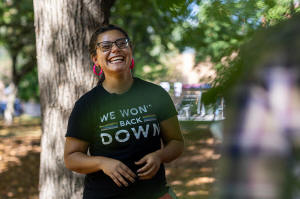A student 'womb service' works covertly to deliver contraception at a
Catholic college
[September 30, 2025]
By CHRISTINE FERNANDO
CHICAGO (AP) — College student Maya Roman has the handoff down to a
science: a text message, a walk to a designated site, and a paper bag
delivered with condoms and Plan B emergency contraception. At DePaul
University, it’s the only way students can get a sliver of sexual health
support, she said.
DePaul, a Catholic school in Chicago, prohibits distribution of any kind
of birth control on its campus.
To get around that, a student group runs a covert contraceptive delivery
network called “the womb service.” The group was once the university’s
chapter of Planned Parenthood Generation Action, but it has been
operating off campus since DePaul in June revoked its status as a
student organization.
At Catholic universities, which generally do not offer contraceptives on
their campuses or at school-run health centers, student groups have
stepped in to fill what they see as gaps in reproductive health care. It
often means navigating pushback from college administrators.
In line with church teachings that discourage premarital sex and birth
control, many Catholic colleges restrict access to contraceptives on
campus. The student activists say they are providing essential help on
campuses that enroll students of all faiths.
At DePaul, the university said it banished the student group over its
affiliation with Planned Parenthood, the nation’s largest abortion
provider. It said it also “reserves the right to restrict the
distribution of medical or health supplies/devices items on university
premises that it deems to be inappropriate from the perspective of the
institution’s mission and values.”
“I was in disbelief,” Roman said of the group being forced to disband.
“It was a flood of disappointment.”

Efforts to restrict contraception have mounted around the US
Far beyond college campuses, a growing number of Republican-led states
have seen attempts to restrict access to contraception. Some state
legislatures have sought to exclude emergency contraception and other
birth control methods from state Medicaid programs or have introduced
bills requiring parental consent for minors to access contraception.
The Trump administration has also frozen funding to family planning
clinics that provide free or low-cost contraception and scrubbed Centers
for Disease Control and Prevention guidance on birth control from
government websites.
Conversely, Illinois Gov. JB Pritzker, a Democrat, signed legislation in
August requiring colleges and universities to offer contraception and
abortion medication at on-campus pharmacies and student health centers,
but it applies only to public institutions.
“We do see this massive effort to restrict access to contraception and
abortion throughout the U.S., not just on Catholic campuses,” said Jill
Delston, associate professor at the University of Missouri-St. Louis who
has studied contraception access. “And on Catholic campuses, that may in
some ways be amplified.”
Activist groups connect with students just off campus
Roman, an economics student at DePaul, grew up learning about
reproductive health from her mother, a nurse. When she arrived on
campus, she realized many of her peers had relatively limited sexual
health knowledge. Meanwhile, she said she noticed DePaul’s sexual and
reproductive health resources were lacking.
“It was seeing a need in the community and trying my best to address it
right away,” she said.
Now, the group she leads receives about 15 to 25 orders each week for
contraception and hosts sex education seminars.
[to top of second column]
|

DePaul University senior Maya Roman, 22, president of a student
reproductive health group, smiles while speaking to fellow members
at Oz Park in Chicago on Sunday, Sept. 28, 2025. (AP Photo/Heidi
Zeiger)
 “These schools disproportionately
don’t provide contraception access, so students are stepping up to
fill those gaps so that other students aren’t being prevented from
controlling their own reproductive destiny and reproductive
freedom,” said Maddy Niziolek, development specialist at Catholics
for Choice, which helps students organize against Catholic
universities’ restrictions on contraception access.
At Loyola University, another Catholic institution in Chicago,
Students for Reproductive Justice delivers condoms, lubricant,
pregnancy tests and emergency contraception directly to students.
They receive as many as 20 orders in a single night. The group also
hosts Free Condom Friday, where members pass out condoms at bus
stops just off campus.
The group applied for registered student organization status in 2016
but was denied, said Alyssa Suarez Tineo, a junior studying women
and gender studies and an organizer for SRJ Loyola.
“Loyola’s motto is ‘cura personalis,’ care for the whole person,”
she said. “And this is just an example of Loyola not living up to
what it promises.”
At the University of Notre Dame, the student group Irish 4
Reproductive Health formed in 2017 to file a lawsuit challenging the
university’s decision to deny birth control coverage to students and
employees. The group today distributes contraception off campus.
Gabriella Shirtcliff, the group’s co-president, said its work “helps
reduce the risk of unplanned pregnancy that might require someone to
get an abortion.”
Organizers see Catholic colleges as ‘challenging environments’
A lack of access to contraception can have deep, long-term impacts
on students’ lives, Delston said.
“What’s at stake for these students is their bodily autonomy — the
direction of the rest of their lives, their ability to pursue their
goals, get a degree, have a career or start a family at the time it
suits them,” she said.
In 2020, the American Society for Emergency Contraception launched
an effort to help student activists expand contraception access on
college campuses. The group has helped install 150 vending machines
that dispense emergency contraception on campuses.

At Catholic universities, students usually have to start smaller
than a vending machine, said Kelly Cleland, the group’s executive
director. The first step, she said, is helping students figure out
what’s possible.
“This is a lesson for them about organizing in challenging
environments,” she said.
At DePaul, the students behind the womb service have re-registered
under a new name — Students United for Reproductive Justice — and
plan to continue distributing contraceptives this semester. Roman
said she hopes more students on Catholic campuses challenge their
universities’ reproductive health policies.
“It is possible; it is feasible,” she said. “And you’re not alone in
this fight.”
All contents © copyright 2025 Associated Press. All rights reserved |